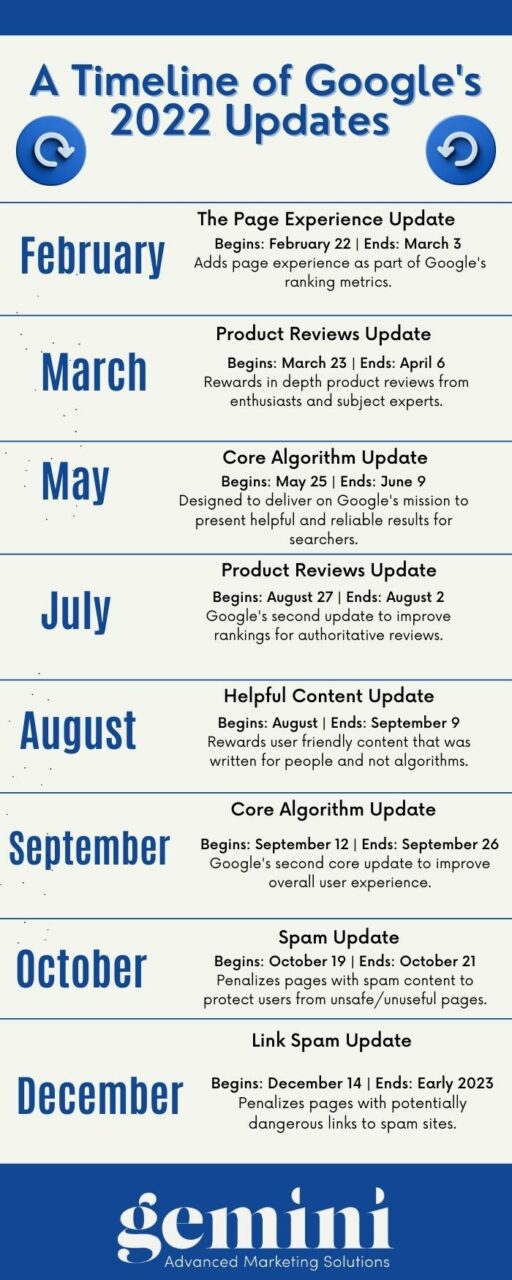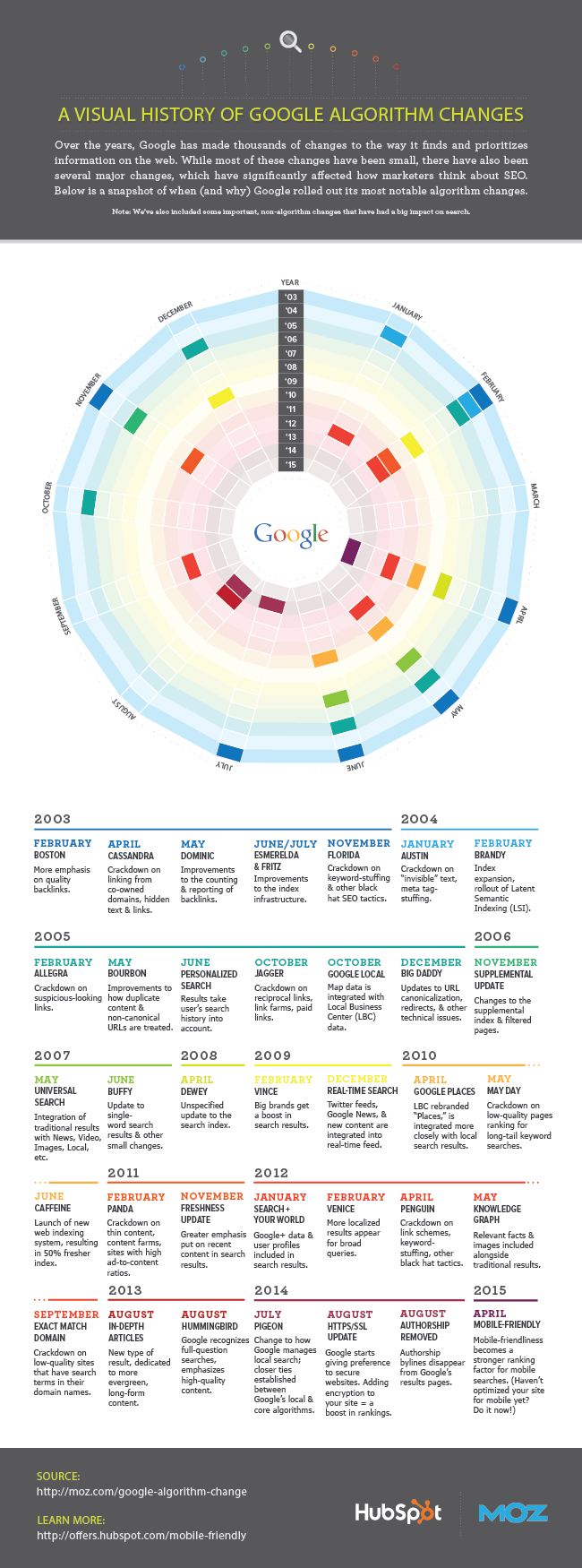Remain Ahead of the Contour: SEO Techniques for Google's Algorithm Updates
Remain Ahead of the Contour: SEO Techniques for Google's Algorithm Updates
Blog Article
Comprehending the Effects of Google's Formula Updates on SEO Methods and Positions
In the ever-evolving landscape of search engine optimization (SEARCH ENGINE OPTIMIZATION), the ramifications of Google's algorithm updates have ended up being a centerpiece for companies and online marketers aiming to keep or enhance their online presence (Google’s Algorithm Updates). As Google continues to refine its algorithms to provide customers with one of the most top quality and pertinent search results, understanding exactly how these updates influence SEO methods and rankings is extremely important. From the refined changes in keyword methods to the more noticable focus on customer experience, the interaction in between formula updates and search engine optimization techniques introduces a complex internet of considerations that require continuous alertness and flexibility
Development of Google's Algorithm

The Panda update, launched in 2011, targeted low-grade content and penalized web sites with duplicate, thin, or unnecessary content. Penguin, launched a year later, dealt with web link spam by decreasing the value of manipulative links. Hummingbird, introduced in 2013, noted a change in the direction of semantic search, understanding the context and intent behind user inquiries as opposed to simply matching keywords.
These updates compelled web site owners and SEO experts to focus on user experience, quality material, and natural web link building strategies to enhance their rankings in Google's search engine result. The evolution of Google's algorithm highlights the search engine's commitment to providing valuable and pertinent web content to individuals while penalizing techniques aimed entirely at video gaming the system.
Effect On Keyword Phrase Approach
With the evolution of Google's formula towards focusing on user experience and material relevance, the Effect on Key words Strategy has actually become significantly important for website owners and SEO specialists seeking to line up with these search engine updates. Keyword phrases are no longer simply concerning matching search terms yet comprehending user intent and supplying useful material. Google's updates, such as BERT and RankBrain, focus on natural language handling and context, making keyword approach extra advanced.

Furthermore, with Google's focus on semantic search and user-focused material, key phrase stuffing is no more reliable and can also harm positions. Rather, including keyword phrases normally right into high-grade, relevant material is essential. By understanding the influence of Google's formula updates on key words method, internet site owners can boost their SEO efforts and enhance their exposure in search results page.
Changes in Material Optimization
As the landscape of seo proceeds to advance, internet site proprietors and search engine optimization specialists are observing considerable shifts in material optimization strategies. In the wake of Google's algorithm updates, there has actually been a growing emphasis on producing top notch, appropriate, and reliable web content that provides worth to customers. This indicates that simply stuffing keyword phrases into posts is no longer reliable; rather, web content needs to be well-written, engaging, and tailored to fulfill the demands of the target audience.
In addition, there is a better focus on user experience and fulfillment, with search engines gratifying web sites that supply a smooth surfing experience and beneficial information. As an outcome, material optimization currently includes not only incorporating appropriate key words naturally but additionally structuring reference material in a means that is easy to check out and browse.
Relevance of User Experience
Enhancing user experience on an internet site is critical in contemporary SEO techniques, working as a vital consider figuring out a site's presence and success in internet search engine rankings. Customer experience incorporates different elements such as website rate, mobile-friendliness, user-friendly navigation, and appealing web content (Google’s Algorithm Updates). Google's algorithms increasingly prioritize web sites that use a gratifying and smooth customer experience, as it straight associates with individual complete satisfaction and retention
A positive customer experience not only improves a site's SEO performance however also adds to greater conversion rates and customer commitment. Internet sites that are very easy to browse, aesthetically appealing, and provide important material are more probable to draw in and retain site visitors. On the other hand, sites with poor user experience metrics may experience high bounce rates and reduced dwell times, signaling to online search engine that the material might not be pertinent or interesting for users.
As a result, buying enhancing customer experience is vital for maintaining a competitive edge in the ever-evolving electronic landscape. By prioritizing user-centric style and performance, sites can enhance their search engine rankings and eventually drive even more organic traffic and conversions.
Approaches for Future Adjustment
Progressing in the quickly advancing landscape of search engine optimization, it is crucial for organizations to take on innovative techniques for future adjustment. One key strategy is to focus on producing premium, appropriate content that supplies worth to individuals. This web content ought to be enhanced for search phrases that align with individual intent and ought to be consistently updated to stay affordable and present.
In addition, organizations ought to prioritize mobile optimization to provide to the raising number of customers accessing the internet through mobile devices. Guaranteeing that sites lots swiftly, are easy to browse, and offer a seamless individual experience on smart phones can aid improve search positions and user contentment.
Furthermore, leveraging data analytics and user actions insights can assist organizations understand their target audience better and tailor their SEO approaches accordingly. By monitoring crucial efficiency indications and adjusting techniques based upon data-driven understandings, organizations can stay in advance of the curve and adapt to the ever-changing SEO landscape. Welcoming emerging technologies, such as voice search optimization and fabricated knowledge, can likewise be valuable for future-proofing search engine optimization methods.
Final Thought

With the evolution this contact form of Google's formula in the direction of prioritizing user experience and web content importance, the Effect on Keyword phrase Strategy has actually become progressively vital for internet site proprietors and SEO specialists seeking to line up with these click now search engine updates. Google’s Algorithm Updates. Keywords are no longer just concerning matching search terms but understanding customer intent and supplying important web content. Google's algorithms progressively focus on web sites that use a enjoyable and smooth user experience, as it straight associates with individual complete satisfaction and retention
In comparison, web sites with inadequate individual experience metrics might suffer from high bounce prices and low dwell times, indicating to search engines that the web content might not be relevant or engaging for individuals.
The advancement of the formula has changed focus towards user experience and quality web content, influencing keyword approach and content optimization.
Report this page